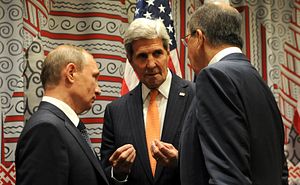What will President-Elect Donald Trump’s foreign policy vis-a-vis Russia look like? Similar to so many other subjects concerning the presidency of Donald Trump details are sparse, but there are already some indicators where the relationship could be heading.
The first official reaction, that came from Russian president Vladimir Putin after Trump’s surprising victory, laid out the foundation for future cooperation: “Building a constructive dialogue between Moscow and Washington — one based on principles of equality, mutual respect and a real accounting of each other’s positions — is in the interest of both nations and the world.”
On the surface, this demonstrated that Russia hopes the relationship can be fundamentally reshaped. Among other things Moscow may long for recognition as an equal power. Russian President Vladimir Putin appears to see President Trump as a partner. Conversely, judging from his election rhetoric, Donald Trump, as a transactional leader, is of the view that it will be possible to cut deals with the Russian president.
As a result, the U.S.-Russia relationship is bound to improve in the short run should the United States accommodate Putin’s desire to be seen as an equal. It may even influence developments in Syria and help break the political and military stalemate in the country. In their first phone conversation on November 14, Trump and Putin discussed Syria and agreed to “uniting efforts in the fight with the common enemy number one – international terrorism and extremism,” according to a Kremlin statement.
Indeed, it seems that the new U.S. leadership, including the team the president has started to assemble, identifies terrorism and radical extremism as the main security threats currently facing the United States. As a result, a political compromise of some sorts on Syria paired with a joint U.S.-Russian effort to eradicate the Islamic State can be expected to address this priority.
U.S.-Russia frictions may arise, however, over the situation in Ukraine (and in the post-Soviet space in general). Unlike in Syria, a country outside Russia’s traditional zone of influence, Moscow claims privileged status in Ukraine underlined by red lines that no post-Soviet state should dare to cross. These red lines have become increasingly more rigid since 2008 when Russia expressed its disapproval of Georgia’s aspiration for NATO membership and subsequently engaged it in a military conflict.
In 2014, Russia stepped up its demands on former satellite states. Since then it not only views NATO accession as a firm red line, but it would also not tolerate any cozying up towards the European Union or the West in general. Moscow gives the impression that the declaration of neutrality or non-alignment would not be sufficient reassurance for smaller post-Soviet states any longer. These demands, if not met, would deprive those states of a large portion of their sovereignty.
President Trump will have a choice to either accept or reject Russia’s zone of influence. If, despite the many shortcomings that Kiev continues to present, Ukraine is “sold out” to Moscow in the spirit of compromise and no readiness to continue to subsidize that state, doubts about the upcoming administration will arise in many European capitals. It will raise the question whether the United States should contribute to the re-division of Europe into two distinct zones of influence: that of an “enlarged” west and a “reduced” east, with some countries still dithering in-between.
Ukraine will not accept any agreements without U.S. guarantees. If none will be forthcoming, it is difficult, for example, to imagine that Kiev would accept the decentralization of power in Ukraine and provide a special status to the Donetsk and Luhansk areas under the Trump administration when it did not agree to it during Obama’s terms in office.
The President-Elect will have to take into account that nobody in Washington’s foreign policy and security establishment will recommend weakening the Transatlantic link and provide further reason for the Europeans to doubt the credibility of NATO and U.S. security guarantees. It is apparent that the recent farewell trip of President Obama to Europe aimed at reassuring the European allies that the campaign comments of Donald Trump dismissive of NATO should not be taken literally. However, it remains to be seen how President Trump will reconcile his likely non-interference pledge in the post-Soviet space while assuring United States allies and partners in Eastern Europe.
In the end, the question will be whether a middle ground can be found between retaining U.S. leadership in the world without alienating Moscow. However, monitoring the evolution of Russia during the Putin era and its readiness to pay attention to international actors only when their messages are backed by hard power and strong commitment, it is unlikely that Trump’s policy predicated upon non-interference, will leave much room for the United States to press its interests with a Putin-dominated Russia
The Trump administration, touting its ostensibly ready disposition to compromise and nativist regard may also feed into populist sentiments in Eastern and Central Europe, where populists such as Viktor Orbán in Hungary, and Beata Szydlo and Jaroslaw Kaczynski in Poland try to cling to power and could see Trump’s likely non-interference doctrine in the post-Soviet space as a justification to model their politics on Vladimir Putin’s autocratic style.
The short honeymoon between Trump and Putin may well be followed by a long and difficult marriage. The problem may stem from the fact that some passing pronouncements of Donald Trump during the election campaign will be difficult to harmonize with the incoming Republican administration’s declaratory, value-based policy, and interventionist instincts including in the post-Soviet space. This uncertainty in Washington will only add to the unpredictability and volatility in U.S.-Russian relations over the long-term.
Pal Dunay is Professor of NATO and European Security Issues at the George C. Marshall European Center for Security Studies in Garmisch-Partenkirchen, Germany. The views expressed in this article are his own.

































